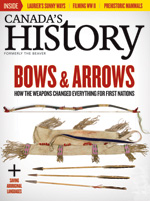There's a special feature on work by young Indigenous writers and artists, growing out of Historica's Aboriginal Arts and Stories project.
My own column profiles John Steckley, southern Ontario white-guy anthropologist, who learned first the Ojibwa language and then Wendat too, mostly from 17th century texts, just 'cause he felt it was part of the job. (Update, September 26: Today at Active History, Steckley offers some thoughts on concepts present and absent in the Wendat language.)
Timely: an excerpt from the new book Finding Franklin by Russell Potter.
Also, a lively feature by Nelle Oosterom, who interviewed three Wilfrid Laurier scholars on their nicely varied perspectives on the former prime minister.
Réal Bélanger: "While he said he was sympathetic to Aboriginal claims, deep down he shared the view of many others regarding the need to civilize Canada's Aboriginal peoples, whom he called "savages," as did everyone in those days.
André Pratte: To me his "sunny ways" was his greatest legacy... I just hope that the fact that it's used today by one politician of one political party does not taint it by a partisan perspective because to me ... the sunny way is the only way to maintain Canada as a united project of a diverse group of people.
Roy McSkimming: When he was in Arthabaska practising law, there was a ritual, usually in the afternoon, when he would rise from his desk and say to his law partner, Joseph Lavergne, "Joseph, if you will permit me, I will go and visit your wife."And, as they say, much more.
